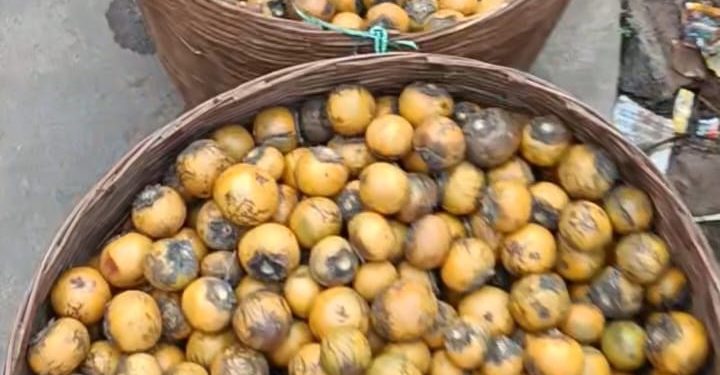Keonjhar: Absence of any structured marketing and adequate promotion continues to hinder the full economic potential of wild kendu (Coromandel ebony), a vital livelihood source for many forest dwellers in Keonjhar district.
Growing naturally in forested hills, gardens and farmlands, the sweet and nutritious kendu fruit is collected in large quantities during its seasonal ripening. Local tribal communities collect and sell the forest product in roadside stalls and village markets, often fetching just Rs 20 to Rs 50 per cone.
However, with better marketing, packaging and supply chain systems, kendu could become as commercially valuable as mangoes or jackfruit, experts feel.
Also Read: Jackfruit cafes coming up in Keonjhar district
“In an era of hybrid crops and chemical fertilisers, people are returning to naturally grown fruits like kendu for their health benefits,” said Harekrushna Mahanata, a traditional Ayurvedic practitioner in the district.
He added that the fruit, rich in vitamins and nutrients, is not only in high demand locally but also in neighbouring regions and states.
However, despite its growing popularity, the benefits of the fruit for forest-dependent communities remain limited. Traders often purchase kendu in bulk at low prices and sell it in urban centres for higher profits. The absence of value-addition processes such as grading, sorting and packaging results in minimal returns for the actual collectors.
Legend has it that the name ‘Keonjhar’ originates from the words kendu (fruit) and jhara (stream), referring to a spring that once flowed from beneath a kendu tree. While the tree holds cultural and historical value, its numbers are dwindling due to rapid deforestation and limited success of reforestation efforts by the Forest department.
“We now have to spend hours under the sun selling kendu by the roadside. Earlier, these trees were in the vicinity of our villages. Now, we are forced to venture deeper into the forest, risking encounters with bears and other wild animals to collect the fruit,” said Kuni Dehuri, a kendu collector from Suakathi in Banspal block.
Local leaders stress the importance of protecting kendu trees and tapping into their economic potential. “If the fruits are properly collected, sorted, packed and marketed, kendu could become a profitable business,” said Pranaballav Nayak, former MLA and tribal leader of the district.
As natural resources like kendu become scarcer, the need for sustainable harvesting and professional marketing becomes urgent—not only to protect the trees, but also to ensure that forest dwellers benefit fairly from the fruit that has provided them livelihood for generations.
PNN







































